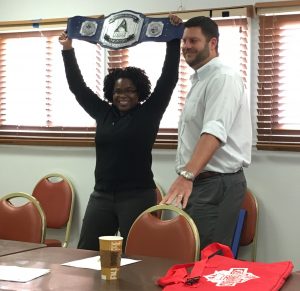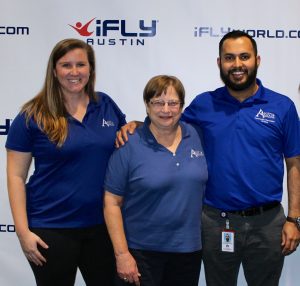Imagine this. You are a working parent. You have a six-year-old child with special needs. You watch, helpless, as she gets kicked out of every available subsidized after-school and summer program. The programs can’t or won’t meet her needs. You don’t know what to do. You don’t know where to go. Who do you call for help?
If you are lucky enough to live in Austin, there’s the Inclusion Unit team at Austin’s Parks and Recreation Department (PARD). They’ve gotten that call. More than once. And each time, they’ve said, “We are here for you, and for your child.” This commitment exemplifies how PARD supports the needs of all its residents. It also exemplifies how manager Tiffany Cabin supports passionate civil servants to provide all residents top services.
I initially knew Tiffany only by her first name. “She doesn’t need a last name,” an Austin civil servant explained. “She’s ‘Tiffany from Parks.’ That’s all you need to say. Everyone knows her. She’s a lifer. She has a legacy.”
Many local civil servants choose public service over higher salaries or less stress. The decision often stems from the desire to serve and ability to see an impact. We serve the places we call home. Many have experienced the challenges and customer service gaps they try to solve. This creates deep knowledge of the changes government can make. It also means the work matters in profound ways.
 Tiffany “from Parks” Cabin exudes this deep personal commitment to public service. She started working in Parks when she was a teenager. She follows in the footsteps of her mother, a Parks manager. Each day after school, Tiffany would hang out while her mother worked. Much of her childhood occurred in the recreation centers she now oversees. “She grew up going to our programs,” says Kipa Smith, the Parks Inclusion Unit Supervisor. Tiffany still talks about attending programs like tap and baton.
Tiffany “from Parks” Cabin exudes this deep personal commitment to public service. She started working in Parks when she was a teenager. She follows in the footsteps of her mother, a Parks manager. Each day after school, Tiffany would hang out while her mother worked. Much of her childhood occurred in the recreation centers she now oversees. “She grew up going to our programs,” says Kipa Smith, the Parks Inclusion Unit Supervisor. Tiffany still talks about attending programs like tap and baton.
Tiffany has never forgotten the impact government service delivery can have, nor the importance of staff to provide them. I’ve interviewed scores of people in government as part of my research on government innovation. The most frequent factor people cite as enabling innovation or preventing job success in government? Leadership. Nigel Jacob is Co-Chair of the Mayor’s Office of New Urban Mechanics. He noted in a recent interview that civil servants often report to “people [who] have the title ‘supervisor,’ or ‘manager,’ but don’t really manage people.”
Not Tiffany. She treats every resident and staff member with radical equality; empowers and teaches instead of micromanaging; champions her staff and the people they serve; and builds trust in government as a place to work and government as a place that can work. This reduces commonly-cited civil servant torpor and malaise, lifting staff spirits, ownership and output.
“Tiffany understands what it’s like to work on a playground when it’s one hundred degrees for eight hours a day with 50 screaming kids. She doesn’t forget,” notes Kipa. By offering mentorship and empowerment, she enables her staff to provide outstanding services. For Jim Kotick, a Program Manager in the Athletics Division of Austin Parks and Recreation Department, this includes overseeing fields and parks that 1000 residents a night use for team sports alone.
“She will not do the task,” Jim says. “She expects you to do it but has no problem showing and helping you once or even twice. But once she’s shown you how to do it, she steps back and lets you go with it. She does not micromanage. She counts on her team to do their jobs.”

Inclusion Unit staff members Laurel Heizelman, Kipa Smith, and Emmanuel Turner.
Tiffany’s trust enables the Inclusion Unit to tackle the toughest challenges residents in PARD spaces face. A unique PARD offering is adaptive recreation center with dedicated programming for persons with disabilities and special needs. A team of certified therapeutic recreation specialists staff trains the entire Parks staff on special needs. They also provide the one-on-one assistance that residents of all ages require in order to access the parks.
“These are challenging times,” Kipa noted. “Decreases in Texas early childhood intervention funding happened at the same time as we saw an increase in demands on school systems of kids with pretty serious mental health issues.” Issues range from physical disabilities to emotional instability. This includes kids struggling to make friends, to make it through an after-school program without getting upset or throwing things or just being generally unhappy.
The Inclusion Team works long, intense hours under Tiffany’s management. The Austin Parks and Recreation Department manages 300 parks, 227 miles of trails, 50+ pools, 11 museums, 26 rec and senior centers, and 200+ fields and courts. It has 690 employees year-round, and hires over 1000 employees more in the summertime, from lifeguards to counselors to coaches. It is also the entity behind a favorite Texas summer activity, swimming at Barton Springs pool.
Beyond respecting and empowering her staff, Tiffany champions them. Recently, she elevated the Inclusion Unit’s work to her own management to define a specific Inclusion Unit budget item to City Council. “I can’t tell you how good that made us feel,” said Kipa. “To have a leader who was willing to go to her leadership, go to City Council and ask for those dollars to support this work because she believes in us – that has never happened before. And it wouldn’t have happened without Tiffany.”
As Maya Angelou once noted, people will forget what you said, people will forget what you did, but people will never forget how you made them feel. “I’ve had other management and I could get my job done,” said Kipa. “With Tiffany, the difference is that I feel completely supported. I know that she’s got my back, I know that she is singing my staff’s praises every opportunity she gets.”
Her staff may not be related to her by birth, but like Tiffany’s mother before her, they are part of her legacy and her family. Her legacy will live on with and through them, just as theirs live on residents they support, who find joy and support through the Austin PARD.
This column is part of “In Something We Trust,” a series highlighting under-recognized government employees and public servants working to solve problems, improve services and strengthen communities across the country. Know a public servant who deserves recognition? Email Hudson at newamerica.org to nominate her, him, or them.
Sara Hudson is part of the GovLoop Featured Contributor program, where we feature articles by government voices from all across the country (and world!). To see more Featured Contributor posts, click here.





I adore this story. Thank you for telling us all about Tiffany Cabin. I know there are a million like her out in government working every day, and not getting the glory they deserve. By telling her story you are helping folks everywhere understand the love and passion that most government workers put into their jobs on a daily basis!